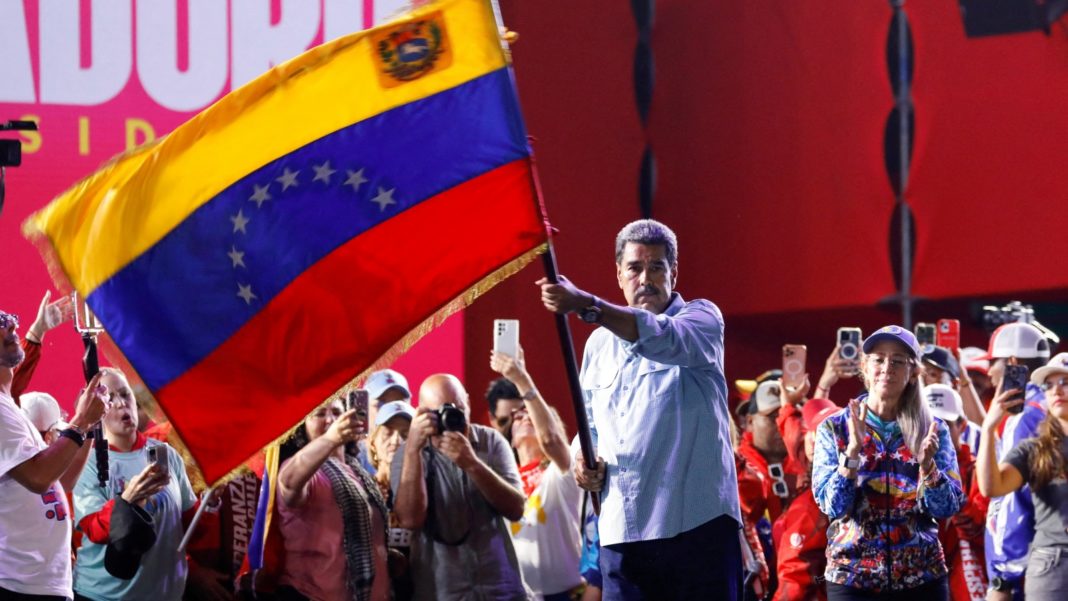Venezuela will head to the polls on Sunday for what is expected to be the most closely-watched presidential election in the country’s modern history.
Opposition supporters believe they have a real chance to oust incumbent President Nicolás Maduro, who is seeking a third term after 11 years in power.
Maduro faces significant challenges as he campaigns against opposition candidate Edmundo Gonzalez Urrutia. With his tenure marked by crisis, voters must decide whether to reelect Maduro or give the opposition a chance to reverse the ruling party’s policies, which have led to economic collapse and driven millions to emigrate.
Interestingly, this election coincides with the birthday of the late Venezuelan President Hugo Chávez, Maduro’s mentor. Here’s everything you need to know about Venezuela’s presidential election.
Who is Nicolás Maduro
Nicolás Maduro, the successor to the popular socialist Hugo Chávez, assumed power in Venezuela after his death. Chávez, who was battling cancer, handpicked Maduro to serve as interim president. Maduro took on the role in March 2013 and won a narrowly contested presidential election the following month.
Maduro was reelected in 2018 in an election widely criticised as fraudulent. His government banned Venezuela’s most popular opposition parties and politicians from participating, prompting the opposition to call for a boycott due to the lack of a fair electoral process.
Under Maduro’s rule, the popularity of both him and his United Socialist Party of Venezuela has sharply declined. An economic crisis, exacerbated by falling oil prices, corruption, and mismanagement, has severely impacted the country.
Once boasting the largest proven oil reserves and Latin America’s most advanced economy, Venezuela plunged into crisis after Maduro’s ascent. The country faced plummeting oil prices, widespread shortages, and hyperinflation exceeding 130,000%, leading to social unrest and mass emigration.
Sanctions imposed by the Trump administration, aimed at ousting Maduro after his 2018 reelection, further exacerbated the situation.
The Maduro-led coalition controls 256 out of 277 seats in the National Assembly, Venezuela’s legislative body. This near-total control has allowed his government to dominate other crucial institutions, including Venezuela’s highest court and the National Electoral Council (CNE), which is responsible for organising elections.
While Maduro still relies on a loyal base of supporters, known as Chavistas, including millions of public employees and others dependent on state employment or contracts, his ability to leverage social programs to secure votes has diminished as the economy continues to deteriorate.
The Opposition
On the other side is González, representing the Unitary Platform coalition of opposition parties. He was selected in April as a last-minute replacement for the opposition’s leading figure, María Corina Machado, who was barred from running for any office for 15 years by the Maduro-controlled Supreme Tribunal of Justice.
Machado, a former lawmaker, won over 90% of the vote in the opposition’s October primary.
However, after she was prevented from joining the presidential race, she initially chose a college professor as her substitute.
The National Electoral Council also blocked this replacement from registering, leading to González, a political newcomer and former diplomat, being selected.
The Unitary Platform coalition, despite its diverse political views, is united in its primary goal: to end Maduro’s presidency and improve relations with the West.
The coalition aims to secure sanctions relief and boost investments to improve conditions in Venezuela, hoping to enable members of the diaspora to return home.
The Maduro government has defended its actions by accusing opposition figures like Machado of attempting to overthrow him and supporting U.S. sanctions against Venezuela.
Maduro has portrayed the opposition as agents of foreign powers, claiming they would privatise the social programs that many poor residents depend on for support.
How did their elections campaigns differ?
The Venezuelan election has highlighted stark disparities between the top contenders, particularly in terms of resources. This contrast was evident during the final day of campaigning on Thursday.
Maduro appeared before supporters on a grand stage set up on one of the city’s main roads. His rally featured musical intermissions and dances throughout his speech.
He portrayed himself as a man of peace while labeling his opponents as promoters of violence. Notably, in a campaign rally on July 17, Maduro warned that a bloodbath could ensue if the opposition won.
This remark drew condemnation from global leaders, including Brazilian President Luiz Inácio Lula da Silva, who cautioned Maduro against anti-democratic actions.
In contrast, González and Machado conducted their campaign by travelling through the city atop a platform mounted on a truck, eventually reaching a middle-class district of the capital.
State television broadcast Maduro’s rally live in its entirety while ignoring the opposition’s event. The opposition’s efforts were hampered by a lack of funding and government repression.
This included restrictions on Machado and any service providers willing to support or contract with her campaign. As a result, their rally on Thursday suffered from inadequate sound equipment, making it difficult for all supporters to hear, an AP news report stated.
The opposition has also attempted to capitalise on the significant economic inequities resulting from the crisis, during which many Venezuelans have abandoned their currency, the bolívar, in favor of the US dollar.
Why the election matters?
The outcome of the election will have significant repercussions far beyond Venezuela’s borders.
According to a BBC report, the economic and political crisis under Maduro’s administration has driven 7.8 million Venezuelans to flee the country over the past decade.
Polls conducted in the run-up to the election suggest that this exodus could accelerate if Maduro wins another term, the same report states.
Most Venezuelans who migrated in the last 11 years have settled in Latin America, the Caribbean, and more recently, the U.S.
In his rallies, González has urged supporters to envision a future where “our airports and borders are filled with our children returning home.”
With immigration being a hot topic in the US election, the outcome in Venezuela will be closely watched in Washington as well as in Latin American countries that have received large numbers of Venezuelan emigrants.


